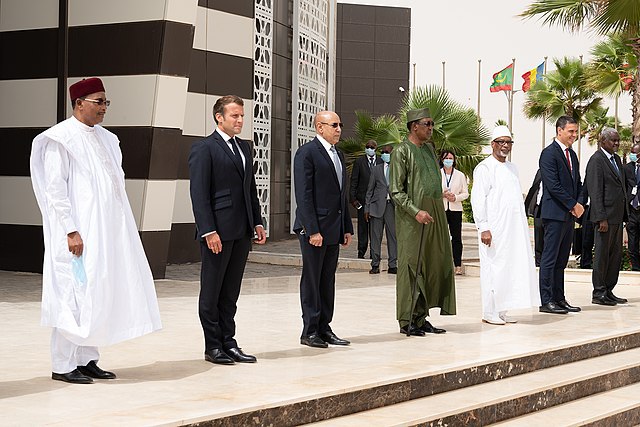By Clayton Barrington-Russell, BA Arabic and International Relations
After almost a decade, the French military presence in the West African state of Mali has drawn to a close. Despite President Emmanuel Macron denying a military ‘failure,’ many Malians feel that the European ‘counter-terrorist’ force has contributed to the destabilisation of an already volitile local political climate.
It is believed that French and EU troops will remain in the Sahel region, as part of a ‘joint action’ mission to combat the spread of so-called ‘jihadist’ groups, such as Islamic State in the Greater Sahara.
Despite the persistent presence of an international military force, these militias have continued to claim responsibility for attacks on civilians in Mali and bordering countries Burkina Faso and Niger. According to Reuters, an estimated 610 civilians were murdered in Niger last year by suspected ‘Islamist’ militants.
The relatively stable state of Burkina Faso has faced its own terror attacks, such as a tragic attack on a hotel in the capital Ouagadougou in 2016, despite also housing a large European military presence.
What initially brought French soldiers to the country?
French forces have been in Mali since 2013. A year prior, vast swathes of the North had fallen to Tuareg separatists and forces allied to Al-Qaeda in the Islamic Maghreb. Such a takeover soon garnered international condemnation, as these militias began to painstakingly dismantle the fabled Islamic monuments of Timbuktu.
In late 2012, both Mali and the Economic Community for West African States (ECOWAS) called for foreign military intervention, and on 11 January 2013 the French military launched ‘Operation Sevare.’
This involved the deployment of 1,500 troops who had been advancing towards the capital Bamako. Despite initially repelling the militants and pushing them back into the country’s arid North, the French forces were unable to conclusively defeat them.
To this day, these groups continue to launch attacks and kidnappings against civilians, not just in Mali, but across the wider Sahel region as well.
What went wrong for the French force?
Amid a recent surge in attacks conducted by the self-titled ‘jihadists,’ the French military withdrawal comes at a time in which it is being accused of inefectiveness in stopping such clashes. France is also facing issues domestically.
According to various polling firms, including BVA and Odoxa, almost 60% of the French public disapprove of Macron’s presidency, placing him in a precarious situation concerning international deployments.
Malians are in support of the Western military force’s withdrawal, accusing them of aiding in the destablisation of the country due to their inability to conclusively deal with the militants.
Upon the news of the French withdrawal, the streets of Bamako were reported to be jubilant, with Russian flags interspersed in the crowds. Additionally, there have been many reports of the military government in Mali hiring a considerable number of Russian mercenaries to ensure its protection. Although these are presently only hired soldiers, Russian influence in the land-locked African state is growing.
By distancing Mali from Western militaries, interim President Goïta has chosen to rethink and realign alliances with Russia – a military force that has demonstrated its capabilities in Syria and elsewhere.
A diplomatic breakdown
The decision for these forces to leave comes after a recent breakdown in relations between Mali and its former colonial ruler. The French Ambassador has been expelled, and the state has publicly accused France of training ‘terrorist groups’ in the country.
In the last ten years, the country has experienced three coup d’etats – including two in the past two years.
In August 2020, protests against corruption and government failures in dealing with the northern insurgency led to the overthrow of President Ibrahim Boubacar Keïta.
The coup, led by the army, received international condemnation and the country was suspended from the African Union and ECOWAS. Mali became increasingly isolated.
Bah N’daw was named interim President, but tensions broke out between the transitional government and the military, as the latter accused the former of abusing its power. Nine months later, the Malian Army, led by then-Vice President Assimi Goïta, deposed N’daw and announced new elections in 2022.
To the disappointment of the West, Mali proposed in the new year to ECOWAS that the transition period back to democracy should be extended by five years. This was deemed ‘unacceptable’ by the West African Economic Community, and sanctions were imposed on the struggling economy.
“many academics see Mali’s political exile from the international community, coupled with a breakdown in relations with France, as a catalyst for the shift in its foreign policy”
As climate change continues to devastate the Sahel region with drought, many academics see Mali’s political exile from the international community, coupled with a breakdown in relations with France, as a catalyst for the shift in its foreign policy.
Photo Caption: French President Emmanuel Macron stands alongside the government representatives of the G5-Sahel (Mauritania, Niger, Burkina Faso, Mali, Chad), 2020 (Credit: Pool Moncloa/Borja Puig de la Bellasca, Wikimedia Commons).
